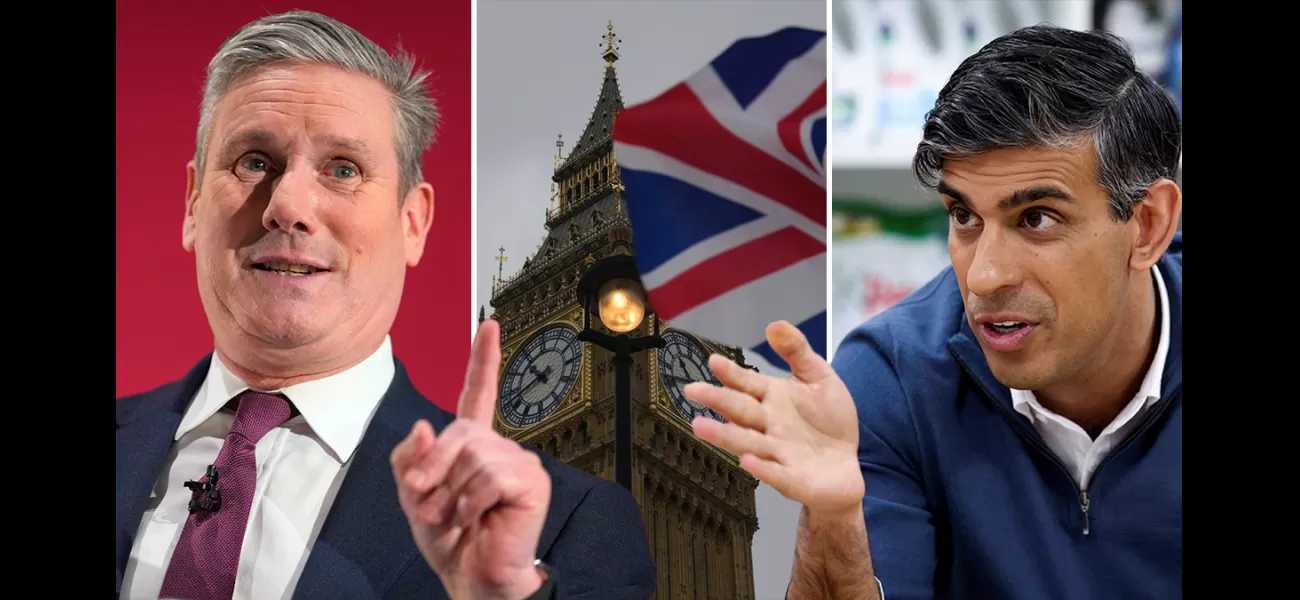Get the scoop on the UK's first election in years.
Sunak shocked everyone by calling for an election on July 4th, but it could lead to a major loss for him.
July 2nd 2024.

It was just six weeks ago when the UK Prime Minister Rishi Sunak surprised everyone by calling for a general election while standing in the pouring rain outside 10 Downing Street. Many wondered if this risky move would be enough to overcome the widespread frustration with his Conservative party after their 14-year reign, and the general perception that they were simply waiting for Labour's Keir Starmer to take over. But as the country heads to the polls on Thursday in the first election in almost five years, the answer appears to be a resounding no, if the opinion polls are anything to go by.
Sunak and his fellow Tories have been pleading with their supporters to turn out and vote, in order to avoid "sleep walking" into a crushing Labour victory. However, they also adamantly deny giving up hope of remaining in power. Despite their efforts, the Tories have stumbled repeatedly during the campaign, while Labour has played it safe with their so-called "Ming vase" strategy, capitalizing on the government's unpopularity. As a result, the centre-left party is currently leading in most opinion polls, with their campaign focused on one simple word: change. Of course, as history has shown us, nothing is certain until the votes are counted, and voters have been known to surprise pollsters in the past.
But amidst all the speculation, much of the uncertainty seems to revolve around the role of third-party players in this election. Can the Liberal Democrats' leader Ed Davey, known for his love of stunts, make a significant impact on their 11 seats? Will Reform UK's Nigel Farage, a fiery political figure who prides himself on being a disruptor, be able to steal as many Tory seats on the right as Labour is expected to win on the left? And what will happen in Scotland, where the race is heating up between the dominant Scottish National Party and Labour?
According to the latest polls, Labour is currently in the lead, with a comfortable margin over the other major parties. The BBC's poll tracker shows that Starmer's party has actually extended their lead since the election was called, and is predicted to receive somewhere between 35% and 45% of the vote. The Tories are trailing in second place with 15% to 25%, followed by Reform with 13% to 19%. Some predictions even suggest that the Tories may only hold on to around 100 out of 650 seats, which would be their lowest total in history. Such a performance has been described as an "extinction-level event" by some.
The biggest change in opinion during the campaign came when Farage announced, after much speculation, that he would be running for office and taking over as leader of Reform. This move had a significant impact on the polls, with his party siphoning votes from both Labour and the Tories. But how did we get to this point? The Conservative party, also known as the Tories, have been in power since the global financial crisis, winning three consecutive elections. However, their years in power have been marked by a sluggish economy, declining public services, and a series of scandals, making them an easy target for criticism from both the left and the right.
The Tories also face competition from other parties, such as the Scottish National Party, who are campaigning for Scottish independence, the Liberal Democrats, and the Democratic Unionist Party, who are focused on maintaining ties between Britain and Northern Ireland. These smaller parties may play a crucial role in forming a coalition government if no single party wins a majority. And let's not forget about the new Reform Party, led by Brexit campaigner Farage, who is known for his divisive rhetoric and anti-migrant stance. His promises to cut immigration and focus on "British values" have resonated with many disillusioned Conservative voters.
In this election, we have seen a diverse range of leaders vying for power. On one side, we have Sunak, a former Treasury chief who took over as prime minister in October 2022, leading the Tories. On the other side, we have Starmer, a former director of public prosecutions and leader of the Labour Party since April 2020. And then there are the smaller parties, each with their own unique platforms and visions for the country. As the country heads to the polls on Thursday, the outcome is uncertain, and the only thing we can be sure of is that it will be an interesting and unpredictable election.
Just six weeks ago, UK Prime Minister Rishi Sunak surprised everyone when he called for a general election while standing in the rain outside 10 Downing Street. Many wondered if this risk would help make up for the widespread frustration towards his Conservative party, who had been in power for 14 years and were perceived to be biding their time until Labour's Keir Starmer took over.
However, as the UK's general election approaches on Thursday - the first in almost five years - it seems that Sunak's gamble may not pay off. According to numerous opinion polls, the answer is a resounding no. Sunak and his fellow Tories have spent the past few days urging their supporters to come out and vote in order to avoid a "sleepwalking" into a crushing Labour victory. Despite these efforts, there seems to be a general consensus that the Tories have stumbled along the way, while Labour has played it safe with a "Ming vase" strategy, capitalizing on the government's unpopularity.
At the forefront of Labour's campaign is the promise of change, which has helped them gain a significant lead in most opinion polls. However, as history has shown, it is never certain until the votes are counted, and voters have been known to surprise pollsters in the past. But as the country heads to the polls, much of the uncertainty surrounds the third-party players.
Will the Liberal Democrats' leader Ed Davey, known for his love of stunts, be able to boost his party's 11 seats? Can Reform UK's Nigel Farage, a political firebrand and self-proclaimed disruptor, steal as many Tory seats on the right as Labour is expected to on the left? And what will happen in Scotland, where the dominant Scottish National Party is facing off against Labour?
According to every major opinion poll in the country, Labour currently holds a commanding lead. The BBC's poll tracker shows that Starmer's party has actually extended their lead since the election was called and is predicted to win between 35% and 45% of the vote. The Tories trail behind with 15% to 25% of the vote, followed by Reform with 13% to 19%.
In the most dire predictions, the Tories are expected to hold onto only 100 seats out of 650, which would be their lowest total in history. Many have described this outcome as an "extinction-level event". The biggest change in opinion during the campaign was when Farage announced his decision to run for office and take over as leader of the Reform party. Polls showed that his party gained support from both Labour and the Tories in the aftermath.
So, how did we get to this point? The centre-right Conservatives came into power during the global financial crisis and have since won three more elections. However, their years in power have been marked by a struggling economy, declining public services, and a series of scandals, making them an easy target for critics on both the left and right. They also face competition from the new Reform party, which has gained support from the right by criticizing the Tory leadership for their handling of immigration.
Leading the Conservative party into this election is Sunak, a former Treasury chief who has been prime minister since October 2022. His primary opponent is Starmer, a former director of public prosecutions in England and the leader of the Labour party since April 2020. However, other parties, some with strong regional support, could play a crucial role in forming a coalition government if no one wins a majority.
Among these parties are the Scottish National Party, which advocates for Scottish independence, the Liberal Democrats, and the Democratic Unionist Party, which aims to maintain ties between Britain and Northern Ireland. Many believe that Farage's Reform party may also take votes away from the Tories.
Farage, a 60-year-old populist, has long divided opinion with his anti-migrant rhetoric and Eurosceptic stance. He was a key proponent of Brexit and has promised to cut immigration and prioritize "British values". He also wants to freeze non-essential immigration and leave the European Convention on Human Rights in order to deport asylum seekers without intervention from human rights groups. On the other hand, Liberal Democrats leader Davey, 58, has been a member of parliament since 1997 and served as the government's energy and climate change secretary from 2012 to 2015. He became leader of the left-of-centre party in 2019 and gained attention during this election with his zany stunts, such as bungee-jumping to encourage voters to take a "leap of faith".
In Scotland, the SNP has faced turmoil since the sudden resignation of long-serving First Minister Nicola Sturgeon last year. Her successor, John Swinney, became the party's third leader in just over a year in May and has been working towards bringing stability to the party. Overall, it is a highly contested election, and only time will tell who will come out on top.
Sunak and his fellow Tories have been pleading with their supporters to turn out and vote, in order to avoid "sleep walking" into a crushing Labour victory. However, they also adamantly deny giving up hope of remaining in power. Despite their efforts, the Tories have stumbled repeatedly during the campaign, while Labour has played it safe with their so-called "Ming vase" strategy, capitalizing on the government's unpopularity. As a result, the centre-left party is currently leading in most opinion polls, with their campaign focused on one simple word: change. Of course, as history has shown us, nothing is certain until the votes are counted, and voters have been known to surprise pollsters in the past.
But amidst all the speculation, much of the uncertainty seems to revolve around the role of third-party players in this election. Can the Liberal Democrats' leader Ed Davey, known for his love of stunts, make a significant impact on their 11 seats? Will Reform UK's Nigel Farage, a fiery political figure who prides himself on being a disruptor, be able to steal as many Tory seats on the right as Labour is expected to win on the left? And what will happen in Scotland, where the race is heating up between the dominant Scottish National Party and Labour?
According to the latest polls, Labour is currently in the lead, with a comfortable margin over the other major parties. The BBC's poll tracker shows that Starmer's party has actually extended their lead since the election was called, and is predicted to receive somewhere between 35% and 45% of the vote. The Tories are trailing in second place with 15% to 25%, followed by Reform with 13% to 19%. Some predictions even suggest that the Tories may only hold on to around 100 out of 650 seats, which would be their lowest total in history. Such a performance has been described as an "extinction-level event" by some.
The biggest change in opinion during the campaign came when Farage announced, after much speculation, that he would be running for office and taking over as leader of Reform. This move had a significant impact on the polls, with his party siphoning votes from both Labour and the Tories. But how did we get to this point? The Conservative party, also known as the Tories, have been in power since the global financial crisis, winning three consecutive elections. However, their years in power have been marked by a sluggish economy, declining public services, and a series of scandals, making them an easy target for criticism from both the left and the right.
The Tories also face competition from other parties, such as the Scottish National Party, who are campaigning for Scottish independence, the Liberal Democrats, and the Democratic Unionist Party, who are focused on maintaining ties between Britain and Northern Ireland. These smaller parties may play a crucial role in forming a coalition government if no single party wins a majority. And let's not forget about the new Reform Party, led by Brexit campaigner Farage, who is known for his divisive rhetoric and anti-migrant stance. His promises to cut immigration and focus on "British values" have resonated with many disillusioned Conservative voters.
In this election, we have seen a diverse range of leaders vying for power. On one side, we have Sunak, a former Treasury chief who took over as prime minister in October 2022, leading the Tories. On the other side, we have Starmer, a former director of public prosecutions and leader of the Labour Party since April 2020. And then there are the smaller parties, each with their own unique platforms and visions for the country. As the country heads to the polls on Thursday, the outcome is uncertain, and the only thing we can be sure of is that it will be an interesting and unpredictable election.
Just six weeks ago, UK Prime Minister Rishi Sunak surprised everyone when he called for a general election while standing in the rain outside 10 Downing Street. Many wondered if this risk would help make up for the widespread frustration towards his Conservative party, who had been in power for 14 years and were perceived to be biding their time until Labour's Keir Starmer took over.
However, as the UK's general election approaches on Thursday - the first in almost five years - it seems that Sunak's gamble may not pay off. According to numerous opinion polls, the answer is a resounding no. Sunak and his fellow Tories have spent the past few days urging their supporters to come out and vote in order to avoid a "sleepwalking" into a crushing Labour victory. Despite these efforts, there seems to be a general consensus that the Tories have stumbled along the way, while Labour has played it safe with a "Ming vase" strategy, capitalizing on the government's unpopularity.
At the forefront of Labour's campaign is the promise of change, which has helped them gain a significant lead in most opinion polls. However, as history has shown, it is never certain until the votes are counted, and voters have been known to surprise pollsters in the past. But as the country heads to the polls, much of the uncertainty surrounds the third-party players.
Will the Liberal Democrats' leader Ed Davey, known for his love of stunts, be able to boost his party's 11 seats? Can Reform UK's Nigel Farage, a political firebrand and self-proclaimed disruptor, steal as many Tory seats on the right as Labour is expected to on the left? And what will happen in Scotland, where the dominant Scottish National Party is facing off against Labour?
According to every major opinion poll in the country, Labour currently holds a commanding lead. The BBC's poll tracker shows that Starmer's party has actually extended their lead since the election was called and is predicted to win between 35% and 45% of the vote. The Tories trail behind with 15% to 25% of the vote, followed by Reform with 13% to 19%.
In the most dire predictions, the Tories are expected to hold onto only 100 seats out of 650, which would be their lowest total in history. Many have described this outcome as an "extinction-level event". The biggest change in opinion during the campaign was when Farage announced his decision to run for office and take over as leader of the Reform party. Polls showed that his party gained support from both Labour and the Tories in the aftermath.
So, how did we get to this point? The centre-right Conservatives came into power during the global financial crisis and have since won three more elections. However, their years in power have been marked by a struggling economy, declining public services, and a series of scandals, making them an easy target for critics on both the left and right. They also face competition from the new Reform party, which has gained support from the right by criticizing the Tory leadership for their handling of immigration.
Leading the Conservative party into this election is Sunak, a former Treasury chief who has been prime minister since October 2022. His primary opponent is Starmer, a former director of public prosecutions in England and the leader of the Labour party since April 2020. However, other parties, some with strong regional support, could play a crucial role in forming a coalition government if no one wins a majority.
Among these parties are the Scottish National Party, which advocates for Scottish independence, the Liberal Democrats, and the Democratic Unionist Party, which aims to maintain ties between Britain and Northern Ireland. Many believe that Farage's Reform party may also take votes away from the Tories.
Farage, a 60-year-old populist, has long divided opinion with his anti-migrant rhetoric and Eurosceptic stance. He was a key proponent of Brexit and has promised to cut immigration and prioritize "British values". He also wants to freeze non-essential immigration and leave the European Convention on Human Rights in order to deport asylum seekers without intervention from human rights groups. On the other hand, Liberal Democrats leader Davey, 58, has been a member of parliament since 1997 and served as the government's energy and climate change secretary from 2012 to 2015. He became leader of the left-of-centre party in 2019 and gained attention during this election with his zany stunts, such as bungee-jumping to encourage voters to take a "leap of faith".
In Scotland, the SNP has faced turmoil since the sudden resignation of long-serving First Minister Nicola Sturgeon last year. Her successor, John Swinney, became the party's third leader in just over a year in May and has been working towards bringing stability to the party. Overall, it is a highly contested election, and only time will tell who will come out on top.
[This article has been trending online recently and has been generated with AI. Your feed is customized.]
[Generative AI is experimental.]
0
0
Submit Comment





